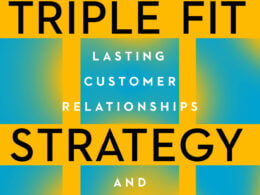The following excerpt is taken from “Launch Your Dream: A 30-Day Plan For Turning Your Passion Into Your Profession” by Dale Partridge. Copyright © 2017 by Dale Partridge. Used by permission of Thomas Nelson. https://launch.startupcamp.com/.
“Launch Your Dream: A 30-Day Plan For Turning Your Passion Into Your Profession” is available today at fine booksellers and can be purchased via StartupNation.com.
Building smart into your start
What makes customers move in the marketplace? What causes them to click a link, hand over their email addresses, purchase a product, or sign up for a service? Many new entrepreneurs assume customers move because of information. They imagine customers weighing the options, evaluating the price, sketching a pros and cons list, and then making the most logical decision. You probably don’t make marketplace decisions this way, so why would you assume that your customers do?
Emotions make a customer move. They click, divulge, purchase, or sign up primarily because of inspiration, not information.
As Geoffrey James, contributing editor to Inc. magazine wrote, “Buying decisions are always the result of a change in the customer’s emotional state. While information may help change that emotional state, it’s the emotion that’s important, not the information.”
Why is this significant for starters to know? Because American families, on average, repeatedly buy the same 150 items, which constitute as much as 85 percent of their household needs. If your product is going to succeed, you need to break into a family’s routine. You need to interrupt your customers’ habits. This means prying their hands off the products they’re already spending their money on and convincing them to spend their money with you instead. The only way to do this is to create a disruptive emotional trigger in your customers that makes them move.
Here are six proven triggers that can propel your startup to success.
People move when they feel excited
One of the best ways to launch strong is to build a sense of anticipation. Have you ever wondered why the internet breaks every time Apple rolls out new products at its worldwide developers conference? And have you ever wondered why people stand in line for hours the day a new iPhone or MacBook arrives—even though they could waltz back into the store a week later and purchase it in 10 minutes? Why can’t they wait? Because they are excited.
Good entrepreneurs know how to build a sense of anticipation. Anticipation creates demand. And demand generates sales.
Before you launch, make sure you announce the launch date. This will help set customers’ sights on a specific time when they can engage with your goods or services. Put a countdown clock on your site, and make your product available early to influencers and members of the press. Then provide aspiring buyers with specific instructions for what they need to do. For example, “arrive at 6 a.m.” or “place your order by midnight” or “use this hashtag to enter.” Then combine the specificity with curiosity, and you’ll generate excitement.
This is what Blake Mycoskie, founder of TOMS Shoes, did when he sent padlocked, six-foot-tall wooden tubes to every Nordstrom store in North America. Inside was a brand-new TOMS product that nobody had ever seen. These tubes sat in stores for two weeks while managers, employees and customers walked past a giant sign that declared, “The Next TOMS Product Will Change Everything” and had a reveal date posted below. When the date came, the doors were opened and the new TOMS sunglass line was unveiled. Because customers were excited, they bought pairs in droves.
Related: Fast-Growing Companies Share This Specific Trait [Book Excerpt]
People move when they feel affection
Customers say yes to people, products and brands they like. The principle is so simple and self-evident, it is almost silly to mention. Think about it. Do you give your money to people and causes that you loathe? No, you don’t. If you want people to move toward your startup, you need to generate feelings of affection toward your startup.
What causes a person to feel affection? Persuasion science reveals at least three important factors:
- We like people who are similar to us. At the most basic level, this means that companies need to feel more human. At a deeper level, this means companies need to feel more like the kind of humans they seek to serve. If you want to attract customers, your startup needs to look and feel similar to them. Faceless companies—businesses without a visible leader—often fail because customers perceive such companies as lacking a soul.
- We like people who pay us compliments. Who doesn’t like to feel good about themselves? We all do. And we naturally gravitate toward those who praise us. If you want to attract customers, your startup needs to encourage and affirm them.
- We like people who share our goals. This point conjures up the importance of your startup’s why. People move when they connect with your mission and purpose and vision. If you want to attract customers, convince them to fall in love with what you stand for.
People move when they feel obligated
When you give something to people, those people often feel they should give back to you. That’s the way humans are designed. If a friend invites you to her party this week, you feel obligated to invite her to your party next week. If a colleague does you a favor this week and asks you for a favor next week, you feel obligated to say yes. One way to get people to move in the marketplace is to give them something before you ask them for something.
In business terms, this transaction is called reciprocity, which should not be confused with generosity. The definition of generosity is to give and expect nothing in return. The definition of reciprocity is to give in hopes of receiving something in return.
I leveraged this tactic during the launch for my book, “People Over Profit,” by offering 500 people a free paperback version of my book before it was available for purchase. I paid for the shipping cost of each unit. All I asked was for them to read the book, leave a review on Amazon, fulfill a few promotion tasks leading up to launch week and join my private online group. By giving them something for free, I leveraged a small army to support my launch. And it worked. We had over 100,000 shares on social media, we trended on Twitter, built hype online, got lots of positive reviews within the first week and many of those same supporters went to the store and bought a copy, too.
Think of this like billions of little bank accounts—one for every person on earth. When you do something for someone else, you make a deposit into their favor bank. They feel that deposit. They know they have a positive balance. They know the money came from you. When you go to withdraw the deposit later, they feel obligated to give it back to you. In the months leading up to your launch, you want to make a lot of deposits in other people’s favor banks. Maybe you write a blog about a friend who has a large following on social media, or you send a gift to someone you’ll eventually be asking for an endorsement. When it comes time to withdraw your funds, you won’t be left empty-handed.
People move when they feel invested
When you launch a startup, you’re asking people to invest their time and hard-earned money in something that is essentially unproven. This is quite an obstacle to overcome, but it is not impossible. The best way to overcome it is to ask them to commit to something small first. This step will make your customers feel invested. And when they feel invested, they are more likely to take the next step out of consistency. People like to be consistent with what they have previously said or done.
My new hometown of Bend, Oregon, has a slogan: “Keep Bend Local.” Imagine that I worked for the city and set a goal of having one out of every 10 citizens in Bend purchase a yard sign with our town’s slogan on it. Rather than asking people to spend the money for the yard sign right away, I might go around town selling “Keep Bend Local” automobile window clings for a quarter. If they agree to do something small, they are more likely to say yes when you ask them to purchase the yard sign. Why? Because it removes the guesswork about where my customers live. Since they’ve already publicly committed to the idea, my request feels consistent with who they are.
People move when they feel comfortable
One of the most valuable emotions in the marketplace is trust. If people trust you, they are more likely to give you the things they value—from their time to their paycheck.
One of the best ways to make people feel comfortable and build trust is to create a sense of authority.
Think about the way you relate to police officers. They wear uniforms and badges not only so you can identify them as police officers, but also because those items convey authority. And because we see them as people with authority, most of us trust them. Because we trust them, we feel comfortable around them. When they speak, we listen. When they tell us to do something, we obey. When we see them, we automatically feel something that makes us respond to them in a certain way.
The same is true with your website and marketing materials. The images you portray and words you use can give a sense of authority and build trust. Or they can undermine both. Apple knows this, which is why it calls its customer service technicians “geniuses.” You’re more likely to see a genius as a person of authority and trust that person with your device or money.
One way to build authority is through validation. I have often used this tactic on my businesses’ websites. Potential customers find endorsements from prominent, successful businesspeople who tell them that they can trust me. Customers then reason that if this many people or that kind of person will vouch for me, then I must be trustworthy. There is a reason I chose Ken Blanchard to write the foreword to this book. And for more credibility, I even added a counter on my blog that shows exactly how many people have subscribed to my email list and how many people follow me on my social media profiles. When people feel uncertain, they look to the actions and behaviors of others to determine their own.
Related: Sign up to receive the StartupNation newsletter!
People move when they feel exclusive
Everyone likes to feel special. They like to be the first ones in line or the only ones in line or to know about a line that no one else knows exists. They like to buy items when there is a limited supply. If you make people believe that the product or service you are selling is scarce, then they will feel exclusive. When they feel exclusive, they are more likely to move.
In 2014, I launched an online event called “Blogcamp.” But rather than let anyone purchase tickets, we made people apply. This drove people nuts. But it drove applications through the roof. We had more than 600 applicants. Since the event wasn’t open to the public, the attendees felt special because they were chosen. We added another dimension with the pricing structure. People could purchase one of three packages: $79, $99 and $149. I made it clear that if customers wanted all the information and content, they would need to purchase the largest package. But there was a limited supply at this level, and we had only 150 spaces. What happened? The $149 packages sold out first.
Amazon will often tell you there are only six items left in stock, so “order soon.” It’s not going to sell out, but you feel as though it might. So you buy. Threadless.com lists how many shirts of each size are left in stock. This makes you feel a sense of urgency, and you’re more likely to buy.
Simply put, people want more of those things they can have less of.
You’re getting ready to launch your startup into the world. Make sure you start smart.
“Launch Your Dream: A 30-Day Plan For Turning Your Passion Into Your Profession” is available today at fine booksellers and can be purchased via StartupNation.com.
Reviews of “Launch Your Dream”
“Dale speaks with authority and will remind you of a simple truth: Your dreams are worth chasing. Inside ‘Launch Your Dream,’ he lays out a blueprint that removes the guesswork for turning your calling into your career. In following Dale’s plan, you will overcome your fears, be excited to chase your dreams and in the process, you’ll transform not just your work, but your life.”
-Mark Burnett, creator of ABC’s “Shark Tank”
“Starting a business is tough–no doubt about it. But getting stuck in a J-O-B that doesn’t feed your dreams and passions can be so much worse! Dale Partridge gives entrepreneurs the practical tools they need to escape that rut and successfully live out their calling in life.”
-Dave Ramsey, best-selling author & nationally syndicated radio show host






